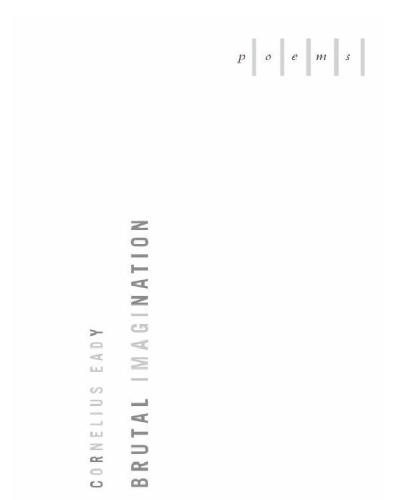
Brutal Imagination
Poems
- اطلاعات
- نقد و بررسی
- دیدگاه کاربران
نقد و بررسی

January 1, 2001
Best known for outlining the nameless figures of old-time city life in a style that, like Charles Simic's, is at once realistic and abstract, Eady, in his seventh collection, boldly takes up the persona of the imaginary black criminal who Susan Smith invented to take the blame for the drowning of her children. "When called, I come," Eady writes. "My job is to get things done." Rather than launching a direct attack on racial injustice, Eady, in the series of poems that comprise the book's first part, makes this Frankenstein's monster into a secret sharer, bound to sit by the suspect's side and shed an invisible tear. "Why do wives and children seem to attract me?" he asks with chilling na vet . These poems resemble Ai's monologues of history and headline, an urgent tabloid origami that takes the lurid and the sensational and rediscovers in them the essentially tragic. In the book's second part, "The Running Man Poems," the hero is again a black criminal, one who starts out a bookish prodigy and somehow winds up conceiving of himself as an outlaw, one whose crimes are little more than spearing insects until, we are given to infer, he kills his lover with a razor and buries her in the pines. In both series, poems of secret perspective contemplate the flawed strength of men as imagined through the medium of women. Their brutal subjects and diction work extraordinarily well in opening strange, brutal hearts to the reader. (Jan. 15) Forecast: This book seems designed to reach beyond habitual readers of poetry, but Susan Smith may be too long out of the headlines to generate the kind of media interest needed for it to break out. More progressive high schools, however, might seize on it for generating discussions, despite a few four-letter words and the disturbing themes.

January 1, 2001
Eady's new book consists of two song cycles. The title sequence involves the imaginary black man that Susan Smith created to cover up killing her two small sons. That ugly, sad lie has given birth to a narrator with wit, personality, and unexpected wisdom. Of course, he is a figment of a white woman's imagination, a black man of white invention, and yet his is a penetrating look at race in America: "I am not the hero of this piece./ I am only a stray thought, a solution." Elsewhere in the sequence, Eady evokes the ghosts of other white creations: Uncle Tom, Uncle Ben, Jemima, and Steppin Fetchit ("the low pitched anger/ Someone mistook for stupid"). Finally, the "Confession": "There have been days I've almost/ Spilled/ From her, nearly taken a breath./ Yanked/ Myself clean." In the second sequence, the "Running Man Poems," a black family faces death and the obstacles of color, class, and caste that test them. This sequence was the basis of Eady's libretto for the musical drama of the same name, a 1999 Pulitzer finalist. With its good, thoughtful work, this volume steps forward to face challenges of its own, and it should be appreciated.--Louis McKee, Painted Bride Arts Ctr., Philadelphia
Copyright 2001 Library Journal, LLC Used with permission.

January 1, 2001
In his seventh collection, Eady, an African American poet honored with many prestigious awards, combines poetry and drama in works of searing clarity. In the first section, he deftly parses the toxic products of the white racist imagination, specifically the image of the black man as threat. Sentient and precise, Eady writes from the point of view of the black kidnapper Susan Smith invented as an alibi for her murder of her two young sons, expressing in a minimum of gorgeously measured words all the painful ironies inherent in her lie and the ease with which it was accepted, and gradually reaching a state of grace in which anger is supplanted by compassion. The lilting second section contains poems from the libretto for a roots opera titled " Running "Man. Although the hero has just died, he speaks bluntly and unforgettably for himself, taking turns with his parents and sisters as their voices combine to create a multifaceted elegy for a man cheated out of the ennobling life of the mind, and driven to a hard-hearted existence of misplaced revenge.(Reprinted with permission of Booklist, copyright 2001, American Library Association.)




دیدگاه کاربران